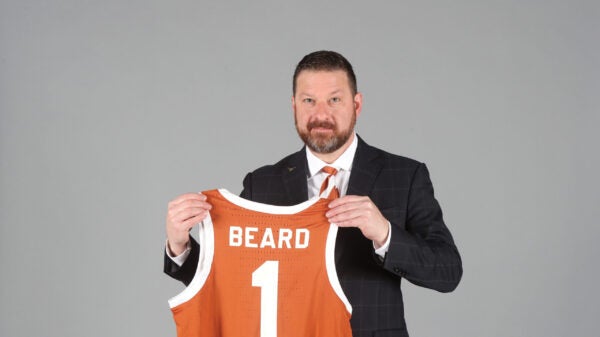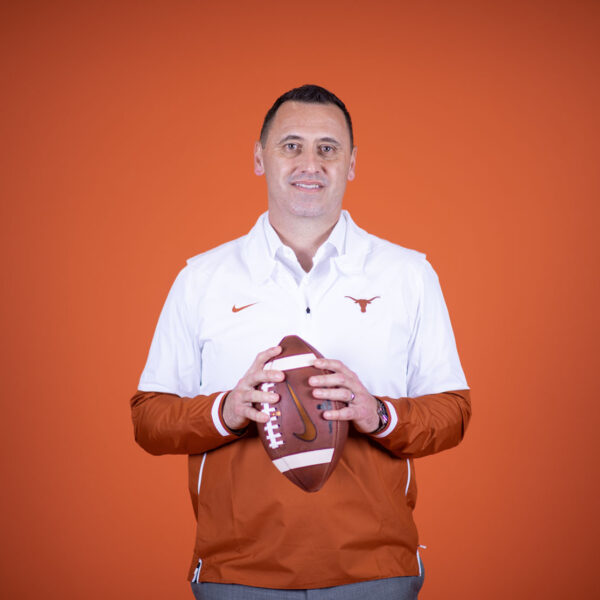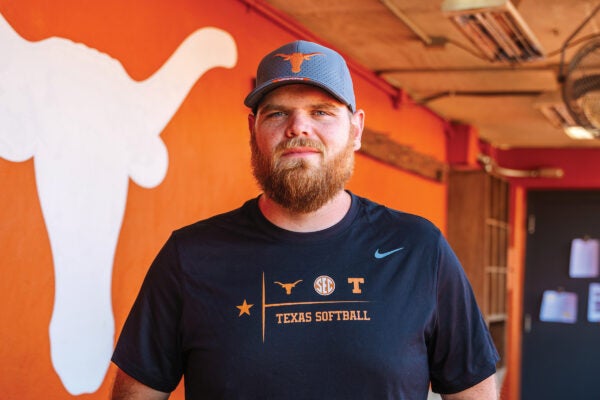As snow and ice covered Texas during a historic winter storm in February, Steve Sarkisian’s new coaching staff stayed put in one large house — “Big Brother” style.
They didn’t flee to the house for shelter. Rather, the storm interrupted their retreat. Sarkisian, who became UT’s head football coach in January, says such getaways are crucial to developing a bond between staff members, especially during the transition stage when everyone is acclimating to new people and a new place.
Three coaches — Jeff Banks, Kyle Flood and AJ Milwee — came with Sarkisian to Austin after serving with him on Alabama’s coaching staff. Stan Drayton and Andre Coleman were with the program last season. Other coaches, such as UT alumnus Blake Gideon, are from around the state or country. Sarkisian says his staff became close-knit living together in the house.
“I would highly recommend to anybody that does build a staff … putting your staff in the same house,” Sarkisian says. “They’re eating breakfast together. They’re commuting to work together. They’re eating dinner together.”
A self-described hugger, Sarkisian took this more human approach to hiring his staff as well. He didn’t interview any of the candidates in a traditional sense. Instead — after watching film of teams they had coached to determine their football IQ — he just had conversations with them.
He made a few jokes to see whether they would joke back. He wanted to see whether they shared any common ground or connections. The organization he runs is relationship-based, so, in a casual sense, he tested potential hires to see whether they would fit in with team culture.
“I don’t want the interview version of them because generally the interview version of them is a front,” Sarkisian says. “I want the real them.”
About three months after Texas hired Sarkisian, UT welcomed Chris Beard from Texas Tech back to his alma mater to take over as the Longhorns’ new men’s basketball head coach. Much like Sarkisian’s football program, Beard’s program is built around people and how well they interact with one another.
That’s why Beard says he leads through relationships and ensures that staff members allow for bonds to manifest between them and players on and off the court.
“I don’t think the objective of building a staff is just to put the most talented people in the room together,” Beard says. “I think it’s to put the most talented people that fit together.”

Beard says he’s high on positive people who bring good energy to the team — people who are unselfish and not entitled, as well as worldly.
“We want to be able to connect to our players on as many levels as possible,” Beard says. “For example, on teams where we have a lot of international players, it’s always nice to have somebody with some international experience on our staff so those guys know that there’s somebody that understands what they’re going through.”
This kind of representation, as well as diversity and inclusion, is among the things both coaches consider in building their staffs.
The racial and social unrest of summer 2020 changed, for many Americans, the way they think about race. Pushes for social justice and hard conversations have all increased in the aftermath of George Floyd’s murder.
Much like other institutions around the country, UT has been challenged to confront its own history, including the origins of its school song, “The Eyes of Texas.”
“Truth-telling,” Beard says, is a core principle in his program. However, being honest in the locker room about the issues on campus and in the nation isn’t always comfortable.
“I think it’s a good thing that difficult conversations are being had,” Beard says. “In our locker room, we just try to talk about it. We don’t shy away from the truth even though the truth sometimes is very difficult and almost embarrassing to talk about.”
The tension on campus is not lost on Sarkisian either. Neither are the people of varying backgrounds in the locker room, which is why seeking diversity on the new coaching staff was paramount.
“I try to get to the real (person) so that I can put this jigsaw puzzle together,” Sarkisian says. “Whether it’s a little older with some wisdom. Whether it’s a little younger with some energy. Making sure that I’ve got enough diversity on my staff to deal with our white players, our Black players, our Polynesian players, our players that are in grad school, our players that are new coming in.”
Of the 11 coaches who will join Sarkisian at practices and on the sidelines this fall, five are Black. Of the seven coaches who will join Beard on the court, three are Black.
Building a strong and diverse staff with the goal in mind of winning football and basketball games, as well as supporting athletes as humans and students, is no small feat.
Ethan Burris, a professor and chair in the Department of Management at the McCombs School of Business, says diversity can be defined as a “distribution of differences.” These differences can include race, gender and sexual orientation, but also personalities, backgrounds, ideologies and experiences.
“Diversity means there’s different perspectives on the same thing. That’s tough,” Burris says. “That’s hard for people to navigate without any bounds or parameters that are usually defined by a culture.”
It’s why uniting people across these dimensions requires good leadership.
“That role of a leader is to set that cultural tone to make sure that people who have different perspectives … that they still feel they can voice those opinions, that they can still feel included in that process,” Burris says. “That takes management. That takes a thoughtful and purposeful individual.”
Sarkisian says he wants players to be free to express themselves, and Beard says he is impressed by the dialogue in the locker room. But conflict and the stresses of leading an organization are inevitable.
Of course, a strong staff is there to support coaches in their goals as well. For Sarkisian, it’s not entirely about how skilled someone is in certain areas. Building a strong team is a bit more organic than that.
“I don’t know if there’s a metric for what exactly is what,” Sarkisian says. “I think there’s a feel factor for sure.”



